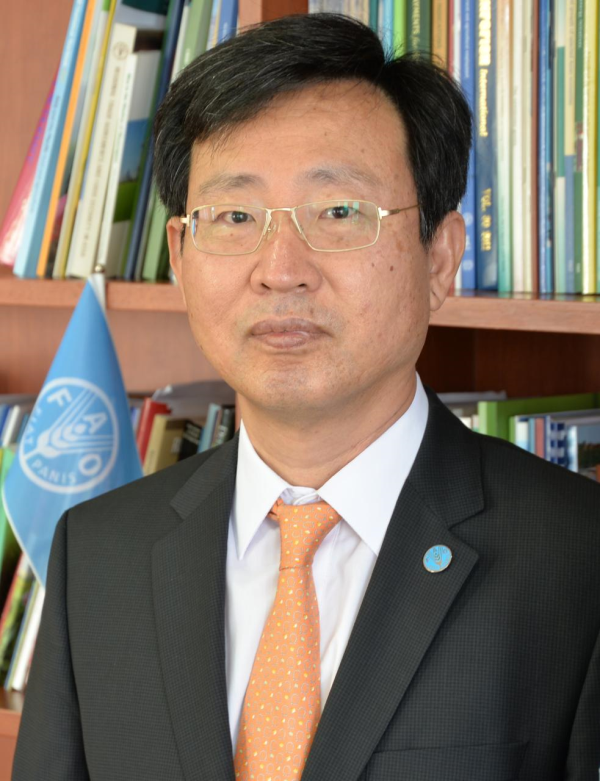ຂປລ
(KPL)In recent months, the Food and Agriculture Organization of the United Nations (FAO) and others have pointed to an increase in food insecurity and ‘hunger hotspots’ in various parts of Asia and the Pacific. While conflicts and climate crises can carry some of the blame, we must acknowledge that the slow but steady erosion of our region’s biodiversity is an equal or even greater threat to our future food security.

By Jong-Jin Kim, Assistant Director-General and Regional Representative, Food and Agriculture Organization of the United Nations (FAO)
(KPL)In recent months, the Food and Agriculture Organization of the United Nations (FAO) and others have pointed to an increase in food insecurity and ‘hunger hotspots’ in various parts of Asia and the Pacific. While conflicts and climate crises can carry some of the blame, we must acknowledge that the slow but steady erosion of our region’s biodiversity is an equal or even greater threat to our future food security.
FAO’s most recent outlook report on Asia-Pacific’s ForestSector found that biodiversity and ecosystem resilience in natural forests are declining along with the capacity of these forests to deliver water and soil protection, climate regulation, amenity and cultural values, and wood, foods, and medicines. Reversing this trend must be a priority for all countries in the region now and in the next decade to ensure our survival, especially in the face of dangerous climate change.
While this biodiversity loss is a crisis for Asia and the Pacific in many ways, the impact it can have on our ability to achieve future food security poses a serious threat. We know from FAO’s recent reports, that the Asia-Pacific region is home to half of the world’s undernourished people and that nearly 45% cannot afford a sustainable and healthy diet. At the heart of some of these nutrition challenges is a food system that is currently founded on a narrow genetic base of 10-15 crops. We have lost much of the diversity that was, historically, commonplace in our diets and increasing dietary diversity is a key part of the solution to ending malnutrition.
According to the ‘The State of the World’s Biodiversity for Food and Agriculture’,published by the FAO Commission on Genetic Resources for Food and Agriculture Assessments, biodiversity for food and agriculture (BFA) contributes to food security and nutrition in many ways. This includesthe enabling of food to be produced in a wide range ofenvironments, helping to maintain the stability of food supplies throughout the year and resilience to shocks such as droughts and pest outbreaks, supplying a wide variety of nutritionally diverse foods.
Indeed, wild biodiversity is an important source of food for many people, particularly in poorer parts of our region. It also provides raw material for crop breeding programmes and contributes to the supply of many ecosystem services that support food production.
So we all need to wake up to this urgent need to better protect Asia-Pacific’s biodiversity, for the good of ourselves, our food security and nutritional health, our environment, and to safeguard those of our future generations.
This month we observe the International Day for Biological Diversity. Its slogan, indeed its call to action, is that we must all“Be part of the Plan” to halt and reverse the loss of biodiversity by supporting actions called for in the Kunming-Montreal Global Biodiversity Framework.
At FAO, we are working to that end in our efforts to help our Member Nations enhance efforts at biodiversity and sustainability in agriculture, aquaculture, fisheries, and forestry,particularly through our updating of action plans to reach the 2030 biodiversity targets. Ultimately, the goal is to ensure a sustainable food systems transformation across the region,to achieve food security, nutrition, and livelihoods –especially for local communities and indigenous people who rely on the existing biodiversity.
Given the importance and the increased demand ofaquatic foodsin our region, and worldwide, FAO has committed to a vision for Aquaculture Transformation for Asia and the Pacific.Thiswill enable the sustainable intensification of aquaculture by improving sustainability and reducing the environmental impacts of production. It also aims to harness the rich and diverse cultural foundation of aquaculture in this region, by strengthening its contribution to food security and improved nutrition, while also securing livelihoods and socioeconomic development, and environmental recovery.
Halting deforestation and forest degradation, while enabling forest and landscaperestoration,are also vital components of addressingthe challenge of biodiversityloss and climate change. Some 15 years ago, FAO and its partners UNDP and UN Environment launched the REDD+Programme. 'REDD+' is the abbreviation for 'Reducing emissions from deforestation and forest degradation in developing countries.’FAO, as co-lead for the UN Decade on Ecosystem Restoration, and host of the Asia-Pacific Forestry Commission, isworkingto support countries in upscaling restoration with an aimfor better livelihoods and environment.FAO also provides technical expertise directly linked to the United Nations Framework Convention on Climate Change (UNFCCC).
With food security as our mandate, along with ending poverty and reducing inequalities, FAO in Asia and the Pacific is responding to help shape national pathways for a food systems transformation.As part of these transformative efforts at country and regional levels, it is imperative to promote sustainable natural resources management, as well as protecting critical ecosystems to conserve biodiversity, protect land, soil, and water – while reducing food loss and energy use.
All of these approaches complement FAO’s overarching global framework to help our Members achieve better production, better nutrition, better environment, and better life for all – leaving no one behind. I believe that, together with many stakeholders, we can ‘walk the talk’ necessary to achieve this. That’s if everyone, including every woman and man in this region, steps forward to ‘Be part of the Plan’.
KPL